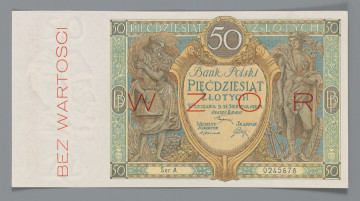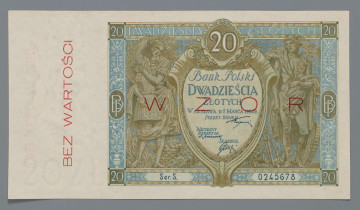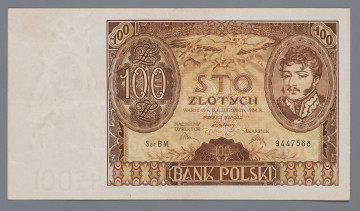
50 zlotys – a template
1925
National Museum in Lublin
Part of the collection: Paper money during the Second Polish Republic
Władysław Grabski's economic reform was one of the most important achievements in the early years of the Second Republic. The improvement of the state's finances was linked to the long-awaited introduction of the zloty as the official currency. The Polish Sejm passed a law on this as early as on 28 February 1919, but it did not come into force until 28 April 1924. The circumstances of the implementation of the reform made it necessary to resort to temporary solutions. The late launch of the State Mint, and the consequent lack of coins, was compensated for by the introduction into circulation of halves of former Polish marks, appropriately marked as equivalents of penny coins. In the case of paper money of higher denominations, banknotes printed in France and Great Britain had been used already five years earlier following a parliamentary decision of 1919. In 1924, an issue limited to five-, ten- and twenty-zloty denominations appeared, preserving the appearance of the 1919 banknotes. These first series were not without errors. Among other things, the legal clause warning of the consequences of counterfeiting was poorly worded. In the following two years (1925 and 1926), a new series of 10-, 20- and 50-zloty banknotes was issued. The clause on these banknotes was improved, but most importantly, the design was completely different. The busts of T. Kościuszko and prince J. Poniatowski disappeared from the obverse. Kościuszko and Duke J. Poniatowski disappeared from the obverse, replaced by allegorical images. The banknotes were first printed by the State Graphic Works and from 10 July 1926 by the Polish Security Printing Works. As the quality of the third issue banknotes left a little to be desired, and as the needs of the market demanded, it was decided to issue an additional fourth issue in 1929. The 1929 banknotes had the same design but the printing quality was improved.
The 50-zloty banknote was designed by Zygmunt Kamiński, professor at the Faculty of Architecture of the Warsaw University of Technology. He was the author of the design of the national emblem, which is still valid today. The banknote is also interesting for another reason. On its reverse side, there are two images showing the historical (from 1828) and the then seat of Bank Polski.
Leszek Poniewozik
Author / creator
Dimensions
cały obiekt: height: 187 mm, width: 99 mm
Object type
paper money
Technique
Material
paper
Creation time / dating
Creation / finding place
Owner
The National Museum in Lublin
Identification number
Location / status

1925
National Museum in Lublin

1926
National Museum in Lublin

1934
National Museum in Lublin
DISCOVER this TOPIC
Museum of King Jan III's Palace at Wilanów
DISCOVER this PATH
Educational path